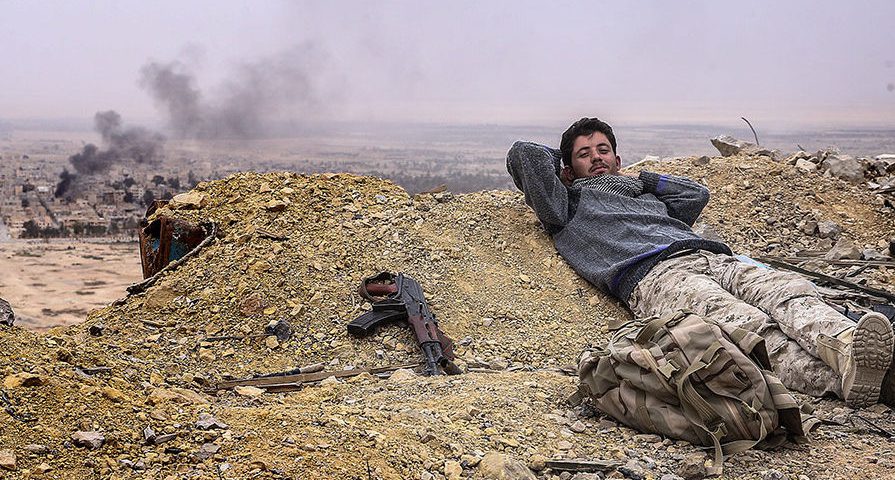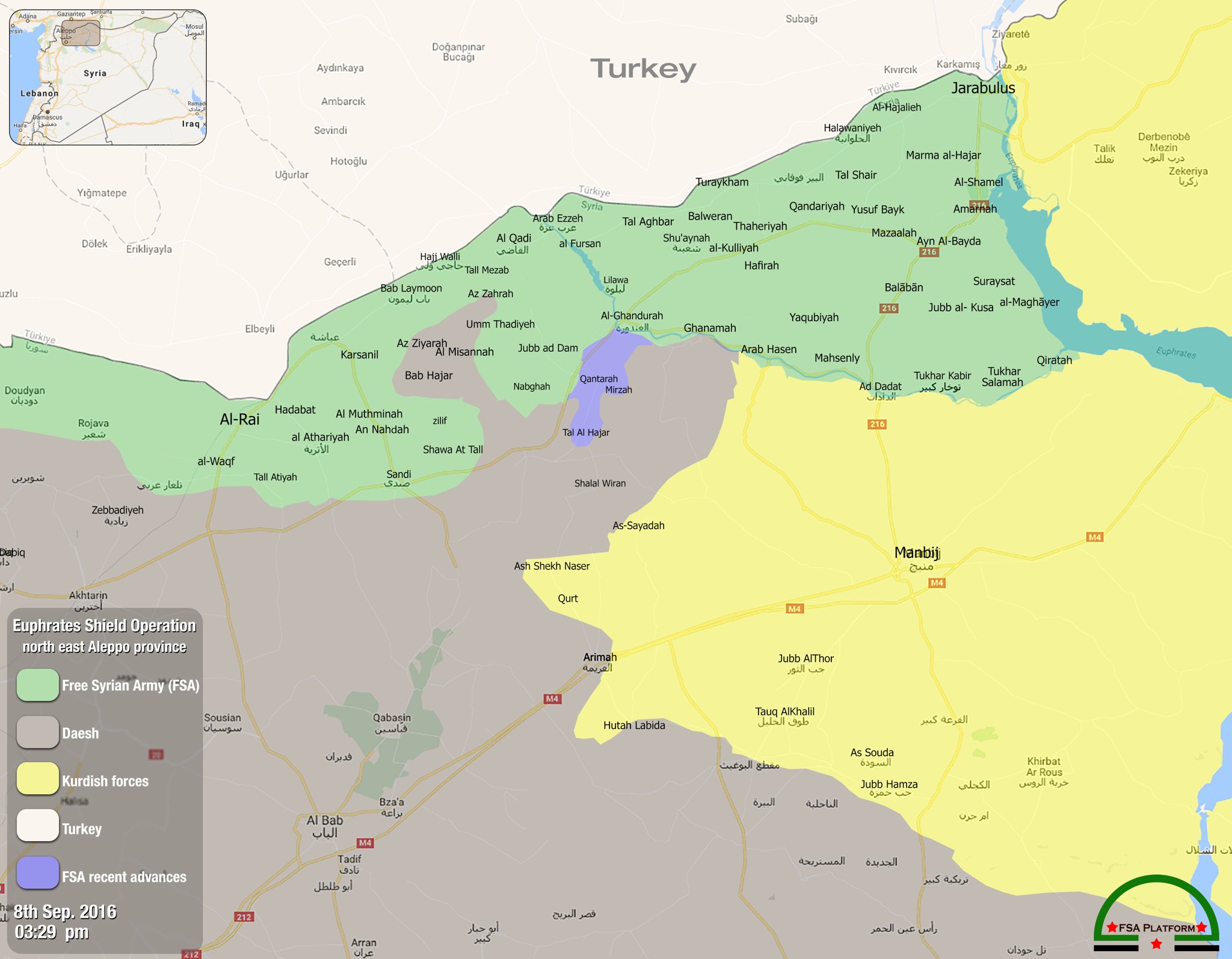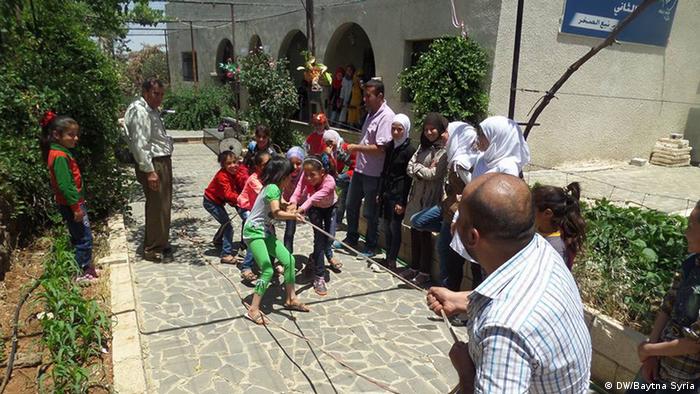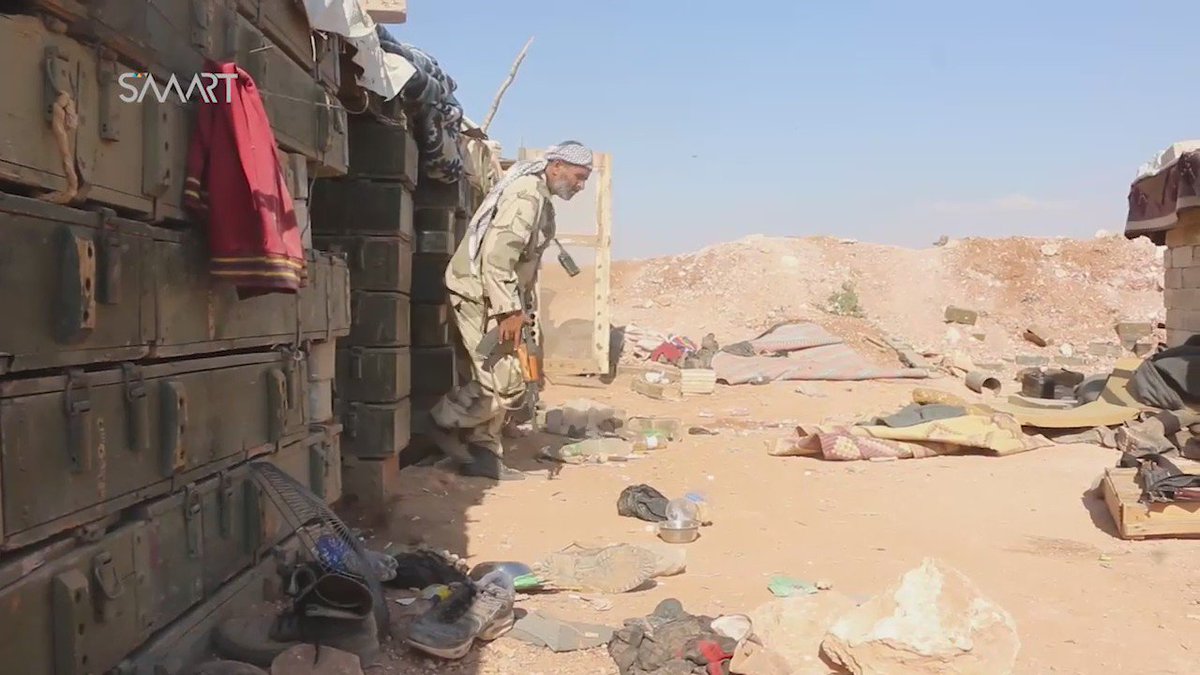
Robin Yassin-Kassab:
' "This is fascinating. Robert Fisk, Patrick Cockburn* and other commentators dressed up as reporters tell us the only coherent force in Syria is the Syrian ‘government’ and its army, and that the Free Army doesn’t exist. Here a Russian imperialist officer, addressing his own, explains that the Syrian army is only good for extortion, that it can’t recruit any more fighters, and that the Free Army and Islamist resistance far outweighs it in morale and combat ability. He concludes that a victory for Assad is impossible, and that Russia should therefore pull out."
While militias, Iranian volunteers, Hezbollah and PMCs fight in lieu of the Syrian army, Bashar Assad’s soldier busy themselves with collecting bribes at checkpoints. This view becomes more and more widespread among military experts aware of the actual situation in Syria. The country’s air force is worn down and uses home-made bombs, the soldiers dig moats to protect from terrorists’ tunnels, while the militants enjoy tactical and moral superiority, says Mikhail Khodarenok, Gazeta.ru’s military observer.
While militias, Iranian volunteers, Hezbollah and PMCs fight in lieu of the Syrian army, Bashar Assad’s soldier busy themselves with collecting bribes at checkpoints. This view becomes more and more widespread among military experts aware of the actual situation in Syria. The country’s air force is worn down and uses home-made bombs, the soldiers dig moats to protect from terrorists’ tunnels, while the militants enjoy tactical and moral superiority, says Mikhail Khodarenok, Gazeta.ru’s military observer.
The actual fighting against opposition groups is mostly done by Syrian militias, the Lebanese Hezbollah Shia units, Iranian and Iraqi volunteers and Private Military Companies (PMCs). The main military actions Assad’s army engages in is extorting a tribute from the locals. The Syrian armed forces have not conducted a single successful offensive during the past year. Apparently Syria’s General Staff has no coherent short-term or mid-term strategic plans. Assad’s generals do not believe their troops can bring the country to order without military aid from foreign states. They do not plan large-scale operations, giving the reasoning of ostensibly high combat capabilities of the illegal armed groups, lack of ammunition and modern equipment, a fear of heavy losses and a negative outcome of the fighting.
The Syrian army fighters see no close end to the crisis. There are no set dates of ending military service. The achievements of soldiers and officers are not encouraged or awarded. The materiel and food supplies are inadequate. There are no benefits for soldiers or their families. Most importantly, even if the Syrian leadership wished to solve these problems, they couldn’t raise the funds to do so. Assad’s government currently has no stable income sources. Years of fighting have severely disrupted the country’s economy. Industrial production has fallen by 70%, agriculture — by 60%, oil production — by 95% and natural production — by 70%. The Syrian treasury has no money even for immediate defense expenditures.
The Syrian army fighters see no close end to the crisis. There are no set dates of ending military service. The achievements of soldiers and officers are not encouraged or awarded. The materiel and food supplies are inadequate. There are no benefits for soldiers or their families. Most importantly, even if the Syrian leadership wished to solve these problems, they couldn’t raise the funds to do so. Assad’s government currently has no stable income sources. Years of fighting have severely disrupted the country’s economy. Industrial production has fallen by 70%, agriculture — by 60%, oil production — by 95% and natural production — by 70%. The Syrian treasury has no money even for immediate defense expenditures.
This situation is further exacerbated by the Syrian army being severely understaffed and underequipped. Currently, the staffing and equipment levels stand a bit over 50% of the required figures. The yearly draft does not satisfy even the minimal needs of the army. Due to this, since 2011 sergeants and privates who have served their terms have not been discharged.
The draft fails due to a number of reasons. Some potential conscripts support the anti-government forces and actively dodge the draft. Others have joined the illegal armed groups. Still others have adopted a wait-and-see attitude, preferring not to fight for any of the sides. Many potential recruits have become refugees outside Syria, some of them in Europe. A large part of the population lives on territories outside the government troops’ control. Finally, recruits and their families fear reprisals from the militants.
The majority of Syrian army units are based at fortified checkpoints. There are in total about 2 thousand such checkpoints throughout Syria. Thus, over a half of the army operates with no connection to their units. Sitting inside those fortified checkpoints, the Syrian regulars are mostly doing defensive duties and extorting money from the locals. They do not conduct any major operations to liberate population or administration centers.
The draft fails due to a number of reasons. Some potential conscripts support the anti-government forces and actively dodge the draft. Others have joined the illegal armed groups. Still others have adopted a wait-and-see attitude, preferring not to fight for any of the sides. Many potential recruits have become refugees outside Syria, some of them in Europe. A large part of the population lives on territories outside the government troops’ control. Finally, recruits and their families fear reprisals from the militants.
The majority of Syrian army units are based at fortified checkpoints. There are in total about 2 thousand such checkpoints throughout Syria. Thus, over a half of the army operates with no connection to their units. Sitting inside those fortified checkpoints, the Syrian regulars are mostly doing defensive duties and extorting money from the locals. They do not conduct any major operations to liberate population or administration centers.
The Air Force deserves a special mention. The Syrian Arab Air Force conducts a significant number of sorties daily (reaching 100 in certain days in 2015), over 85% of which are bombing runs. The Air Force’s contribution to the overall fire damage is about 70%. The airstrikes are conducted by several dozen fighter/bomber jets and around 40 army aviation helicopters. The SyAAF’s main modus operandi is solitary sorties. Flights in pairs and larger units are not done in order to save resources. In order to decrease losses, the bombing runs are done at heights of 3 thousand meters and above. In extreme cases, dive bombing is used.
Due to the lack of air ordnance, the Syrian army has until recently used even sea mines, torpedoes and depth charges for ground attacks. The so-called “barrel bombs” are also widely used. Over 10,000 of the latter have been dropped on the enemy. A “barrel bomb” is a type of home-made air ordnance weighting 200 to 1000 kg. It is a section of a wide oil pipeline welded shut with metal plates from both sides and stuffed with a high amount of explosives. A “barrel bomb” is highly explosive and is used to destroy buildings and attack large gatherings of the militants.
There is no pilot training to replenish the combat losses (training in Russia has been discontinued). The aircraft are not being repaired (the only aircraft repair plant is inside the Aleppo warzone).
Due to the lack of air ordnance, the Syrian army has until recently used even sea mines, torpedoes and depth charges for ground attacks. The so-called “barrel bombs” are also widely used. Over 10,000 of the latter have been dropped on the enemy. A “barrel bomb” is a type of home-made air ordnance weighting 200 to 1000 kg. It is a section of a wide oil pipeline welded shut with metal plates from both sides and stuffed with a high amount of explosives. A “barrel bomb” is highly explosive and is used to destroy buildings and attack large gatherings of the militants.
There is no pilot training to replenish the combat losses (training in Russia has been discontinued). The aircraft are not being repaired (the only aircraft repair plant is inside the Aleppo warzone).
Underground tunnels and passages have been dug in Syria since the times of the Roman Empire and the founding of the first cities, such as Palmyra (Tadmor), Damascus, Raqqa and Homs. The local soil encourages this. Being rather soft and clayey, the soil does not slough, which is why both sides of the conflict toil endlessly to dig underground passages of all kinds and purposes. Militants dig tunnels or use a wide network of old ones to achieve surprise during attacks on military facilities and government troops. Despite a severe underground threat, the Syrian army has a rather negligent attitude to this. There is almost no information on caves or underground communications in towns or militant-controlled territories adjacent to them.
The Free Syrian Army (FSA) higher officers are former General Staff leaders, brigade and division generals and colonels, while the rebel units are mostly staffed with deserters from Assad’s army. The militants are highly mobile and capable of rapidly creating assault groups at critical points of the frontline. They have good knowledge of the area (70% of the illegal armed groups’ fighters are Syrian nationals) and command significant financial and human resources. In the absence of a precise front line, the armed opposition groups engage in active focal fighting. Most of their efforts are applied to holding commanding heights and towns prepared for a perimeter defense. This enables fire control of government troops’ movement lines. The high survivability of the militants during stationary fighting in fortified areas is ensured by using shelters prepared in advance. Those shelters often hide their actual location, numbers and composition.
The militants place observation points close to the contact line for advance detection of the government troops’ assault groupings. A post is manned by 2-3 people with means of observation, communication and transportation. The militants srtive to maintain control over areas by conducting local counterattacks, sabotage in the rear (including suicide attacks), constantly work to seize initiative from the government troops. As a rule, counterattacks are performed by small groups of 10-15 militants in 3-4 cars with mounted heavy machine guns and 82mm mortars, supported by multi-launching rocket systems. One to five such groups may take part in an attack. The purpose of the counterattacks is regaining initiative with the aim to reestablish control over the lost position an the territory in general.
When under attack from Russian forces, the armed groups leave their positions and towns, maintaining small groups of observers. The militants’ units that have sustained significant damage are redeployed to Turkey or to areas under active ceasefire to restore capabilities, reinforce and resupply.
The Free Syrian Army (FSA) higher officers are former General Staff leaders, brigade and division generals and colonels, while the rebel units are mostly staffed with deserters from Assad’s army. The militants are highly mobile and capable of rapidly creating assault groups at critical points of the frontline. They have good knowledge of the area (70% of the illegal armed groups’ fighters are Syrian nationals) and command significant financial and human resources. In the absence of a precise front line, the armed opposition groups engage in active focal fighting. Most of their efforts are applied to holding commanding heights and towns prepared for a perimeter defense. This enables fire control of government troops’ movement lines. The high survivability of the militants during stationary fighting in fortified areas is ensured by using shelters prepared in advance. Those shelters often hide their actual location, numbers and composition.
The militants place observation points close to the contact line for advance detection of the government troops’ assault groupings. A post is manned by 2-3 people with means of observation, communication and transportation. The militants srtive to maintain control over areas by conducting local counterattacks, sabotage in the rear (including suicide attacks), constantly work to seize initiative from the government troops. As a rule, counterattacks are performed by small groups of 10-15 militants in 3-4 cars with mounted heavy machine guns and 82mm mortars, supported by multi-launching rocket systems. One to five such groups may take part in an attack. The purpose of the counterattacks is regaining initiative with the aim to reestablish control over the lost position an the territory in general.
When under attack from Russian forces, the armed groups leave their positions and towns, maintaining small groups of observers. The militants’ units that have sustained significant damage are redeployed to Turkey or to areas under active ceasefire to restore capabilities, reinforce and resupply.
The morale and combat capabilities of the militants are highly above those of the SAA soldiers.
The illegal armed groups have integrated guerrilla and terrorist techniques into their tactics, combining them with conventional warfare methods utilized by regular troops. Their tactics continue to adapt based on the enemy’s behavior. The command system the illegal armed groups have created enables prompt and rather efficient reactive measures towards changing conditions. The militants’ success is made easier by the openness of Syria’s borders (the government only controls the Syria-Lebanon border and a 50 km stretch of the Syria-Jordan border.
The illegal armed groups have integrated guerrilla and terrorist techniques into their tactics, combining them with conventional warfare methods utilized by regular troops. Their tactics continue to adapt based on the enemy’s behavior. The command system the illegal armed groups have created enables prompt and rather efficient reactive measures towards changing conditions. The militants’ success is made easier by the openness of Syria’s borders (the government only controls the Syria-Lebanon border and a 50 km stretch of the Syria-Jordan border.
At the start of the civil war, the government troops enjoyed a quantitative advantage in everything, especially aviation, tanks and artillery. Assad could reasonably hope for a swift success in fighting irregular armed groups of the rebels. However, the Syrian Civil War and the fight against islamists have once again confirmed that a numeric and technical advantage is not enough to achieve victory. Even good theoretical knowledge of the leadership does not play a decisive role.
In order to win a military conflict, just like in old times, one needs a strong spirit, an unyielding will for victory, trust in oneself and one’s troops, decisiveness, bravery, inventiveness, flexibility and an ability to lead others. All this lacks severely in Assad’s army. It is unclear what should be done to the half-rotten structure of the Syrian army. No amount of repressions, be it shootings, penal battalions or retreat-blocking detachments, can’t make it fight. There are no examples of this in military history. Strict disciplinary measures may establish order in shaky units and detachments which fell under a spell of panic on the battlefield. Arms could be used to neutralize the panic and flight instigators, shoot deserters, self-injurers, traitors and defeatists. But no war has ever been won with military tribunals and death sentences. If the soldiers have no higher goal to protect their motherland, aren’t ready to sacrifice themselves, defend every position to the last drop of blood and look into the face of death while rushing in an attack, no amount of penal companies or retreat-blocking detachments can save such an army.
One the one hand, it would seem easy to completely demobilize (in other words, completely disband) the Syrian army and recruit a new one. In other words, restart the process of building up the country’s military. On the other hand, the main problem is that new men are nowhere to be found in modern Syria. Any newly created army will naturally inherit all the malaises of the old SAA. There also is no definitive answer to a substantial question: who’s gonna pay for that?
It is impossible to win the war with such an ally as Assad’s army.
The militias can’t be fully relied on either. Hezbollah and the Iranians have their own interests. This is why apparently the Russian military and political leadership shall have to take a drastic decision: end the Syria campaign before the end of 2016, withdrawing all troops and leaving only the military bases. It is impossible to restore the constitutional order to Syria by solely military means without serious diplomatic, political, economic and propaganda efforts, as well as significant support of the ruined country by foreign states.'
*Patrick Cockburn has been touring an empty Daraya with its occupiers. My comment has been deleted.[http://www.independent.co.uk/news/world/middle-east/the-silent-devastation-of-daraya-capture-of-suburb-is-a-big-step-towards-assad-winning-the-battle-a7232031.html]
'Sickening stuff from Patrick Cockburn. Like touring occupied Srebrenica with Karadjic.
"divided among themselves"
In order to win a military conflict, just like in old times, one needs a strong spirit, an unyielding will for victory, trust in oneself and one’s troops, decisiveness, bravery, inventiveness, flexibility and an ability to lead others. All this lacks severely in Assad’s army. It is unclear what should be done to the half-rotten structure of the Syrian army. No amount of repressions, be it shootings, penal battalions or retreat-blocking detachments, can’t make it fight. There are no examples of this in military history. Strict disciplinary measures may establish order in shaky units and detachments which fell under a spell of panic on the battlefield. Arms could be used to neutralize the panic and flight instigators, shoot deserters, self-injurers, traitors and defeatists. But no war has ever been won with military tribunals and death sentences. If the soldiers have no higher goal to protect their motherland, aren’t ready to sacrifice themselves, defend every position to the last drop of blood and look into the face of death while rushing in an attack, no amount of penal companies or retreat-blocking detachments can save such an army.
One the one hand, it would seem easy to completely demobilize (in other words, completely disband) the Syrian army and recruit a new one. In other words, restart the process of building up the country’s military. On the other hand, the main problem is that new men are nowhere to be found in modern Syria. Any newly created army will naturally inherit all the malaises of the old SAA. There also is no definitive answer to a substantial question: who’s gonna pay for that?
It is impossible to win the war with such an ally as Assad’s army.
The militias can’t be fully relied on either. Hezbollah and the Iranians have their own interests. This is why apparently the Russian military and political leadership shall have to take a drastic decision: end the Syria campaign before the end of 2016, withdrawing all troops and leaving only the military bases. It is impossible to restore the constitutional order to Syria by solely military means without serious diplomatic, political, economic and propaganda efforts, as well as significant support of the ruined country by foreign states.'
*Patrick Cockburn has been touring an empty Daraya with its occupiers. My comment has been deleted.[http://www.independent.co.uk/news/world/middle-east/the-silent-devastation-of-daraya-capture-of-suburb-is-a-big-step-towards-assad-winning-the-battle-a7232031.html]
'Sickening stuff from Patrick Cockburn. Like touring occupied Srebrenica with Karadjic.
"divided among themselves"
No evidence given for this invention.
"There is not so much as an ancient slogan on a wall to show they ever existed."
"There is not so much as an ancient slogan on a wall to show they ever existed."
Cockburn isn't much of a journalist.
[https://notris.blogspot.com/2016/09/painting-revolution-in-daraya.html]
[https://notris.blogspot.com/2016/09/painting-revolution-in-daraya.html]
"The nightmarish complexity of getting UN relief convoys into Zabadani and Madaya."
It isn't complicated, the Assad régime (or Iran in the cases of Zabadani and Madaya) says no, the UN doesn't make a fuss. That's why many NGO are withdrawing their cooperation from the UN.
"But every month or so, commercial traders are allowed in and people stock up."
"But every month or so, commercial traders are allowed in and people stock up."
I doubt this is true. I do know that the people of al-Waer are having to treat their children's burns from government napalm attacks with mud.
[https://twitter.com/moonnor27/status/771255643583807488?lang=en]
Patrick Cockburn would like to believe this is a major victory for Assad, and a sign he will win the war. The truth is Assad needs the appearance of victory against a brave bunch of volunteers who held off his army for four years against overwhelming odds, because he simply doesn't have an army capable of winning any war.'
Note 2/6/25, moonnor link broken.
[https://twitter.com/moonnor27/status/771255643583807488?lang=en]
Patrick Cockburn would like to believe this is a major victory for Assad, and a sign he will win the war. The truth is Assad needs the appearance of victory against a brave bunch of volunteers who held off his army for four years against overwhelming odds, because he simply doesn't have an army capable of winning any war.'
Note 2/6/25, moonnor link broken.







.png)
